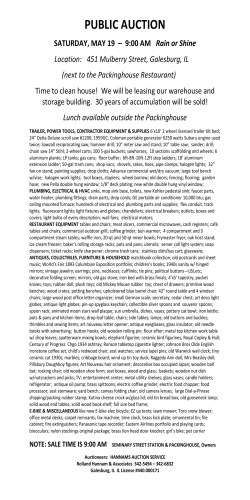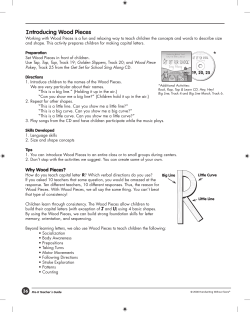
Wood Chipper Pollution Control Facility Tax Credit Application
Wood Chipper Pollution Control Facility Tax Credit Application Version 05:3 ORS 468.155 OAR Chapter 340 Division 16 1. Legal Name of Applicant 4. Contact Name Name Division 5. Taxpayer ID # (EIN) Address 6. Check only one City, State Telephone C Corp. LLC S Corp. Zip E-mail Cooperative Non-profit Sole Proprietor http://www.census.gov/epcd/www/naics.html 8. Tax-year end Month / Day 9. Names of General Partners or Principals Address State Zip County 3. Provide the following wood chipper identification Make Partnership Ltd Partnership Joint Venture 7. SIC or NAICS 2. Primary Location of Wood Chipper City Title Model Name Title Name Title Serial # Individuals skip to 10. NOTE: Microsoft Word Users: To fill in the form select the following sequence from the Word menu: TOOLS:Protect document:forms. Page 1 10. Is the Wood Chipper used 100% of the time in Oregon? yes no If not, please explain and provide the percentage of time it is used in locations outside of Oregon. 11. Enclose a copy of the invoice, receipt or bill-of-sale. The document must be dated. It must show the applicant’s name as the buyer; and include the seller’s name, address, and telephone number. If paid by credit card, provide a copy of the credit card receipt after obscuring the card number. If paid by check, provide a copy of the front and back of the canceled check. Include a brochure or specification sheet describing the wood chipper. 12. Complete the following cost information for the wood chipper. OAR 340-016-0070(1). Invoiced Cost Trade-In Government Grants Ineligible Costs Eligible Cost $ $ 13. Include the appropriate fee. • If the Eligible Cost (Item 12) does not exceed $5,000 then submit the $50 application fee. • If the Eligible Cost (Item 12) is greater than $5,000 then submit the application fee, which is one percent of the eligible cost. 14. Applicant’s Signature I hereby certify that I have completed this application, and that the information provided herein and in all the attachments is true and correct to the best of my knowledge. I certify that the equipment described in this application was purchased and will be operated to a substantial extent for the purpose of preventing, controlling or reducing nonpoint source air pollution as indicated in this application. I certify that if this wood chipper ceases to operate as indicated in this application, I will provide written notice to the Department of Environmental Quality. Signature (Applicant) Send to: Department of Environmental Quality Tax Credit Program 811 SW Sixth Avenue Portland, OR 97204 Title Date Contact: Phone (503) 229-6878 Fax (503) 229-6730 Email: [email protected] Page 2 Application Guidelines This document expresses the Oregon Department of Environmental Quality’s (DEQ) interpretation of the Pollution Control Facilities Tax Credit regulations. The purpose of the application is for the DEQ to obtain the information needed to certify that an investment is eligible for a tax credit according to the Pollution Control Facilities Tax Credit regulations. A certificate permits the taxpayer to claim the credit on their Oregon tax return. About the tax credit An Oregon taxpayer may use the Pollution Control Tax Credit to reduce the amount of state taxes owed. The Eligible Cost (item 12 on the application) is the basis for determining the amount of the credit. To determine the Total Tax Credit, multiply the Eligible Cost by the 35% Maximum Tax Credit Percentage. To determine the Annual Credit that you may claim in one tax-year, divide the Total Tax Credit by the Useful Life of the Wood Chipper. EXAMPLE: X $2,800 35% $980 ÷3 $327.66 Eligible Cost Maximum Tax Credit Percentage Total Tax Credit Useful Life of the Equipment Annual Credit Eligible Costs The wood chipper tax credit is limited to the cost of the wood chipper and any shipping charges. Spare knives, maintenance agreements, add-on tow bars, and power units separate from the wood chipper are examples of ineligible costs. If the wood chipper has a hydraulic feed sensor with hour meter then deduct $250 from the cost. (The purpose of an hour meter is to monitor hours that the chipper is in use for maintenance or billing purposes, which is not an eligible cost.) CAUTION: Regulations prohibit the state from certifying a wood chipper twice. If you plan to buy a used wood chipper, ask the seller if the EQC or DEQ has certified the wood chipper for tax credit purposes. DEQ encourages you to call DEQ with the wood chipper’s serial number for verification. Page 3 CAUTION: The Department must show that the investment in the wood chipper is the applicant’s own investment. The application requests clear payment documentation; therefore, the Department recommends that you avoid a cash sale with an individual. Filing your application The taxpayer may begin claiming the credit on their Oregon tax return beginning with the year that the DEQ or the EQC has certified the equipment. Please allow DEQ plenty of time to process the application before your tax-year end. File the application: After you purchased the wood chipper and have begun using it to chip woody debris; and Within one year of date that you took possession of the wood chipper. This generally coincides with the invoice date. What happens next? DEQ will request any missing information from you via postcard. Otherwise, you will receive your certificate of approval within about 45 days. Page 4
© Copyright 2026











